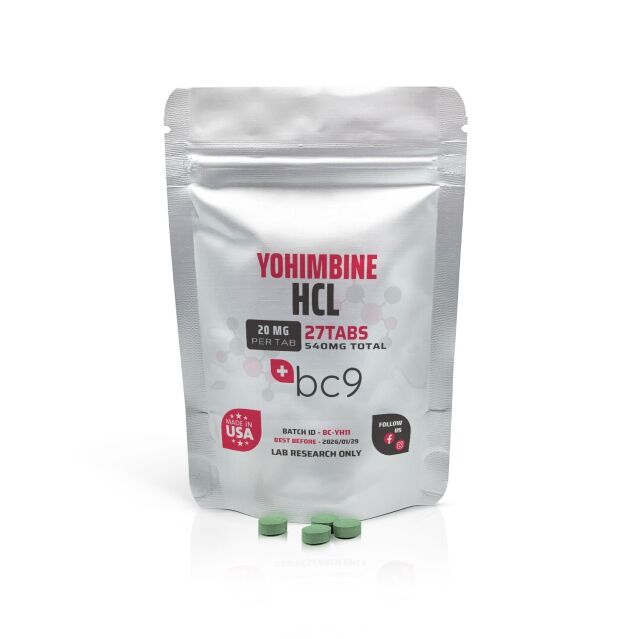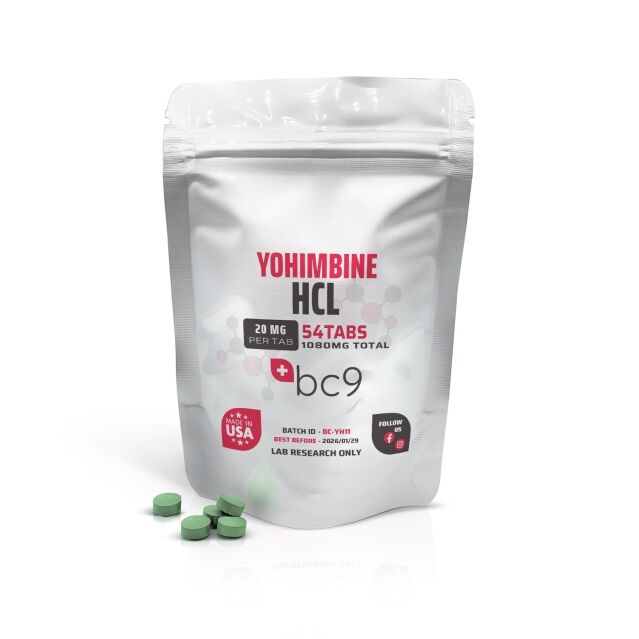Description
| Yohimbine HCL | |
| CAS Number | 146-48-5 |
| Molar Mass | 354.44 g/mol |
| Chemical Formula | C21H26N2O3 |
| IUPAC Name | 17α-hydroxyyohimban-16α-carboxylic acid methyl ester |
Introduction
Yohimbine HCL, a chemical compound derived from the bark of the Pausinystalia yohimbe tree, is a research substance gaining attention for its potential applications in various scientific fields. While its traditional use has been associated with traditional medicine, its research potential is primarily centered around its impact on weight loss, and memory, and its potential implications for diabetes research.
Key Characteristics
Yohimbine HCL is characterized by its adrenergic antagonist properties, particularly its ability to block alpha-2 adrenergic receptors. This characteristic has led to investigations into its effects on metabolic processes, cognitive function, and potential benefits for diabetes-related studies.
Research Applications
Researchers are actively exploring the applications of Yohimbine HCL in various domains. From its potential role in weight loss interventions to its impact on cognitive processes, Yohimbine HCL is a subject of interest for those delving into the intricacies of adrenergic receptor modulation.
Research Benefits
Yohimbine HCL and Weight Loss
Studies have suggested that Yohimbine HCL may have a role in promoting weight loss by influencing the activity of adrenergic receptors, leading to increased lipolysis and energy expenditure. Researchers are delving into its mechanisms and potential applications in weight management.
Yohimbine HCL and Memory
Preliminary research has explored the effects of Yohimbine HCL on cognitive processes, including memory. Investigations aim to uncover whether its adrenergic modulation properties could have implications for cognitive enhancement.
Yohimbine HCL and Diabetes
Some studies have hinted at a potential link between Yohimbine HCL and improved insulin sensitivity. Research in this area is ongoing to understand the compound’s impact on glucose metabolism and its potential as an adjunct in diabetes-related studies.
Summary
Yohimbine HCL, with its adrenergic antagonist properties, is a compound under scrutiny for its potential benefits in weight management, cognitive function, and diabetes research. As researchers delve into its mechanisms and applications, Yohimbine HCL remains a focal point in various scientific investigations.
Disclaimer
This content is presented exclusively for educational purposes and should not be construed as medical advice. THE MATERIALS REFERENCED HEREIN ARE EXCLUSIVELY INTENDED FOR LABORATORY AND RESEARCH USE.
Any clinical research initiatives must be conducted under the guidance of the relevant Institutional Review Board (IRB). Similarly, preclinical research involving animals must comply with the directives of the Institutional Animal Care and Use Committee (IACUC), adhering to the standards delineated by the Animal Welfare Act (AWA).
Our informational content is meticulously designed for research-oriented insights and is not a substitute for individual analysis and verification from credible sources before any purchasing decisions are made.
Upon the finalization of your order and payment, you explicitly acknowledge and agree to adhere to our Terms and Conditions. Customer contentment stands as our paramount concern. Should you find any dissatisfaction with the product received, kindly contact us at 419-707-5450 or email our support team at support@bc9.co.
IMPORTANT NOTICE: All products showcased on our platform are EXCLUSIVELY INTENDED FOR LABORATORY AND RESEARCH APPLICATIONS. They are expressly not intended for veterinary or human utilization.
References
- Ostojic SM. Yohimbine: the effects on body composition and exercise performance in soccer players. Res Sports Med. 2006 Oct-Dec;14(4):289-99. doi: 10.1080/15438620600987106. PMID: 17214405. [Read More].
- O’Carroll RE, Drysdale E, Cahill L, Shajahan P, Ebmeier KP. Stimulation of the noradrenergic system enhances and blockade reduces memory for emotional material in man. Psychol Med. 1999 Sep;29(5):1083-8. doi: 10.1017/s0033291799008703. PMID: 10576300. [Read More].
- Sandberg M, Pettersson U, Henriksnäs J, Jansson L. The α2-adrenoceptor antagonist yohimbine normalizes increased islet blood flow in GK rats: a model of type 2 diabetes. Horm Metab Res. 2013 Mar;45(3):252-4. doi: 10.1055/s-0032-1323843. Epub 2012 Sep 26. PMID: 23015611. [Read More].


David –
Very impressed with this, would recommend it to other people
Gary Franklin –
Consistent, great results every time. Definitely noticeable improvements!
Eshal Glass –
Great quality and fast delivery. Everything arrived sealed and exactly as described.
Sandra Munoz –
Product performed better than expected. Worth every cent.
Powell Lacie –
Truly impressed with the results—clear, noticeable improvements after just a short period.
Jonathan –
Amazing! This product really works.